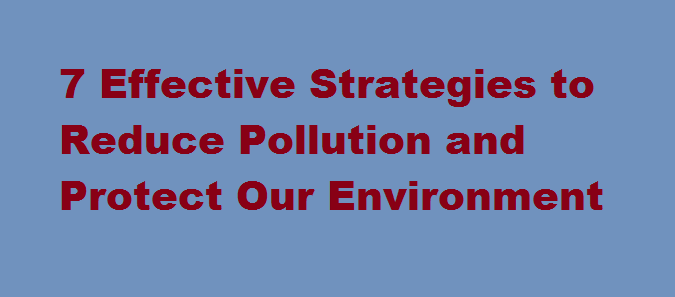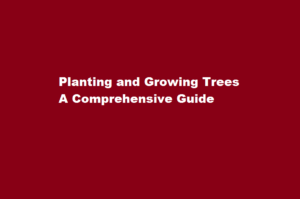7 Effective Strategies to Reduce Pollution and Protect Our Environment
4 min read
Introduction
Pollution is a growing concern that poses significant threats to our environment and human health. From air and water pollution to waste management issues, it’s crucial to adopt proactive measures to reduce pollution. By taking individual and collective action, we can make a substantial impact. This article presents seven effective strategies that can help us mitigate pollution and protect our environment for future generations.
Embrace Renewable Energy Sources
Transitioning from fossil fuels to renewable energy sources is a pivotal step in reducing pollution. Renewable energy, such as solar and wind power, generates electricity without emitting harmful greenhouse gases. Governments and individuals alike should support and invest in renewable energy infrastructure. By promoting the use of clean energy, we can significantly decrease air pollution and combat climate change.
Encourage Sustainable Transportation
The transportation sector is a major contributor to pollution, particularly through vehicle emissions. Encouraging sustainable transportation options can significantly reduce pollution levels. Promote the use of public transportation, carpooling, biking, and walking whenever feasible. Governments should invest in well-connected and efficient public transit systems and establish cycling-friendly infrastructure. Additionally, electric vehicles (EVs) offer a greener alternative to traditional cars, as they produce zero tailpipe emissions. Supporting and incentivizing EV adoption can bring about substantial pollution reductions.
Implement Efficient Waste Management Practices
Proper waste management is crucial in reducing pollution. Governments should establish comprehensive recycling programs to minimise waste sent to landfills. Encouraging citizens to recycle and segregate their waste can significantly reduce environmental pollution. Additionally, implementing waste-to-energy technologies can transform waste into a valuable resource while reducing landfill dependence. Reducing single-use plastics and promoting reusable alternatives are also vital in curbing pollution, particularly in our oceans and waterways.
Enhance Industrial Pollution Control
Industrial activities contribute significantly to pollution. Governments should enforce stringent regulations and encourage industries to adopt cleaner production processes. Implementing pollution control technologies, such as scrubbers and filters, can minimise emissions. Investing in research and development for cleaner industrial practices and promoting sustainable manufacturing methods can further reduce pollution. Encouraging the use of eco-friendly materials and reducing waste in industrial processes are additional steps towards a cleaner and greener future.
Foster Afforestation and Urban Green Spaces
Increasing green spaces and planting trees play a vital role in mitigating pollution. Trees absorb carbon dioxide, filter air pollutants, and provide oxygen. Governments should promote afforestation initiatives and enforce stricter regulations against deforestation. Urban planning should prioritise the creation of green spaces, including parks and gardens, which can help reduce air pollution in densely populated areas. Community participation in tree planting drives and promoting sustainable landscaping practices can also contribute to reducing pollution.
Promote Water Conservation and Protection
Preserving clean water sources is crucial for environmental health. Implementing efficient irrigation systems, such as drip irrigation, can minimise water wastage in agriculture. Encouraging responsible water usage practices at the household level, such as fixing leaks and using water-efficient appliances, is essential. Governments must regulate industrial wastewater discharge and invest in advanced treatment facilities to prevent water pollution. Additionally, protecting water bodies, such as rivers and lakes, from pollution sources like industrial runoff and sewage, is critical to maintaining a healthy ecosystem.
Educate and Raise Awareness
Education and awareness play a significant role in reducing pollution. Governments, non-profit organisations, and educational institutions should conduct campaigns to educate the public about the detrimental effects of pollution and the importance of sustainable practices. Promoting environmental consciousness from an early age fosters a sense of responsibility towards the environment. Encouraging citizen participation through community initiatives and providing platforms for sharing knowledge and ideas can further amplify the impact. Collaboration between government, private sectors, and citizens is key to creating a cleaner and healthier future.
FREQUENTLY ASKED QUESTIONS
What is Pollution Prevention?
Pollution Prevention (P2), also known as “source reduction,” is any practice which reduces, eliminates, or prevents pollution at its source. By reducing the total amount of pollution that is produced, there is less waste to control, treat, or dispose of, and there are less hazards posed to public health and the environment. As Benjamin Franklin once said, “an ounce of prevention is worth a pound of cure.”
How Can Pollution Prevention Be Achieved?
Pollution may be prevented by many types of approaches. Reduction of pollutants can be achieved by using raw materials, energy, and water more efficiently. Conserving and protecting natural resources can also reduce the amount of waste produced.
Actions which may prevent and reduce pollution include
- product redesign
- substitution of raw materials
- process or equipment modifications
- improvements in maintenance, training, inventory control, or housekeeping
Why is Pollution Prevention Important?
Preventing pollution offers important benefits, as pollution never created avoids the need for expensive investments in waste management and cleanup. By anticipating the future, Pollution Prevention reduces both financial costs (waste management and cleanup) and real environmental costs (health problems and environmental damage). As a result, Pollution Prevention holds the exciting potential of protecting the environment and strengthening economic growth through more efficient production and natural resource use.
Conclusion
Reducing pollution is a collective responsibility that demands immediate action. By embracing renewable energy, promoting sustainable transportation, implementing efficient waste management practices, enhancing industrial pollution control, fostering afforestation, conserving water, and raising awareness, we can mitigate pollution levels and safeguard our environment. Each individual’s contribution, coupled with government initiatives and policies, is crucial in creating a sustainable future for generations to come. Let us take action today for a cleaner and healthier tomorrow.
Read Also : The Ultimate Guide How to Get the Coveted Blue Tick on Instagram






